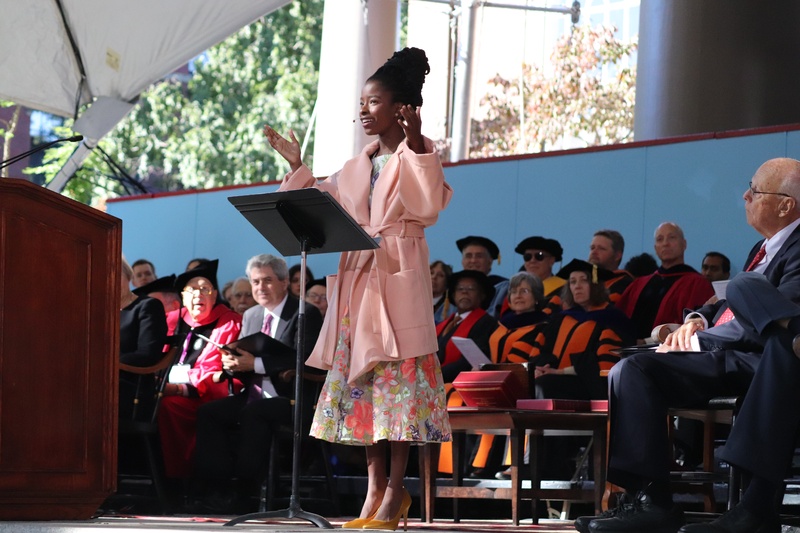On Jan. 20, nearly every household across the United States watched the inauguration of President Joe Biden. Damp-haired from the shower and with cinnamon oatmeal in hand, I dropped onto the couch between my parents to watch as well. Truth be told, my family is a family of various priorities. My father came into the living room to watch Joe Biden morph into President on the 40-inch screen. My mother took a break from stirring the pot of black beans to comment on Jennifer Lopez’s hair. And I, the former high school slam poet, ate my breakfast, waiting for the inaugural poem.
Then came Amanda S. Gorman ’20, the 22 year-old poet and activist in a yellow coat, to stand in front of the podium. For roughly five minutes, she spoke of hurt and hope, of history and legacy. Halfway through, my mother’s voice betrayed her shock. “She’s so young!”
My mother’s sentiment has reverberated across the internet. News outlets, from the New York Times to The Jakarta Post, conclude: Gorman was an unexpected but welcome addition to the inauguration ceremony. The Guardian goes so far as to claim that Gorman reminded them that politics needs poetry. I, on the other hand, think that Gorman’s presence on the 21st only reinforced what adolescent writers already know: The world needs young poets.
It makes sense that the broader public — people like my mother who do not regularly read poetry — was shaken into the realization that poetry is important work, that young poets are powerful and capable of change. Young poets aren’t regularly splashed across television screens as, say, college football players are, making it easy to go decades without encountering their work. After hearing Gorman read “The Hill We Climb,” it’s easy to look at the uncovered obvious and ask, how did we miss this?
Until Gorman’s inaugural poem, many people were missing out on this: the power of the youth and their poetry. Preteens, adolescents, and young adults have been meaningfully sharing their emotions, thoughts, and ideas through stanzas long before Gorman’s inaugural address dominated headlines. Urban Word, the organization that runs the Youth Poet Laureate Program, is a literary arts and youth development nonprofit that has spotlighted young poets since 2008. Since Gorman’s National Youth Poet Laureateship, several others have held the title, including Patricia Frazier, Kara Jackson and Meera Dasgupta, not to mention the hundreds of poets recognized at the regional and local levels.
Organizations like Urban Word don’t just do the invaluable work of identifying the next giants of the literary landscape, but they also lend young poets the opportunity to seriously hone their craft. They treat poetry, along with performance poetry, with the respect it so rightfully deserves. As a result, literary arts organizations are often the first space where young poets feel their writings will be received with something more than a skeptical snort.
Gorman’s presence at the inauguration ceremony, in turn, lends legitimacy to poetry from the young; she puts a face to the ever-growing number of seventh graders who want to be writers, the middle and high schoolers secretly scribbling metaphors in their notebooks.
Her presence is simply a reminder that important spaces are incomplete without young people. Her performance is a gentle nudge towards the increasing inclusion of young poets, young activists, and young changemakers in places of power. Gorman’s inaugural poem, in the end, is proof of what happens when young talent is invested in and young voices are heard. When young poets are taken seriously, they shake the world, starting at the swearing-in of the 46th President of the United States.
—Staff Writer Penelope M. Alegria can be reached at penelope.alegria@thecrimson.com.
Read more in Arts
Yes, Those Inauguration Coats Were Intentional













